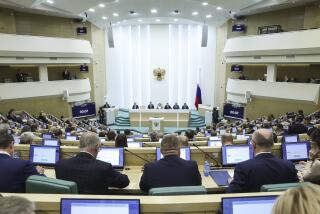Call It Off
- Share via
The White House is practicing ruffles and flourishes for a December 7 summit meeting where medium-range nuclear missiles will be banned from Europe. The summit may even set the United States and the Soviet Union on a course that might lead to deep cuts in the 10,000 or more deadly long-range missiles that each country has aimed at targets in the other.
But while that is going on, the Pentagon is planning to test-fire a missile sometime between now and the summit that--no matter what its real target--will also be aimed point blank at the very arms-control process that negotiators must use to get such deep reductions.
The test weapon is a new version of the missile that Trident submarines carry in their 24 launch-tubes, each of which is fitted out with eight warheads. Once the new missile is tested with 12 warheads, the Soviets can be expected to count every Trident missile in the future as a 12-warhead weapon. And justifiably so. The plan to test the missile with four extra warheads is unfortunate proof of the premise that is as old as technology itself: if something can be done, it will be done.
Washington might get around the problem by devising an elaborate scheme of verification that would satisfy the Soviets that Trident missiles in the future would carry only eight warheads. That in itself would complicate negotiations on reducing the number of long-reach missiles. Or the United States might actually turn all Trident missiles into 12-warhead weapons. With a planned fleet of 20 submarines, that would add 1,920 new warheads to the inventory at a time when the superpowers are struggling to cut their strategic nuclear arsenals in half.
If the deep cuts are agreed to, loading 12 warheads on the Tridents would mean that the United States would have its allowable warheads aboard fewer missiles, thereby complicating the task of keeping the U.S. strategic deterrent survivable.
It is not clear to us--and perhaps not even to the Navy--how putting more warheads on a Trident missile would enhance national security.
What is clear is that going through with the Trident II test would profoundly complicate efforts to reduce the number of missiles with the reach to devastate both the United States and the Soviet Union. The Pentagon should call off the tests.
More to Read
Sign up for Essential California
The most important California stories and recommendations in your inbox every morning.
You may occasionally receive promotional content from the Los Angeles Times.













